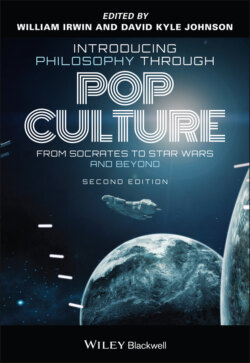Читать книгу Introducing Philosophy Through Pop Culture - Группа авторов - Страница 50
Skepticism Within the Matrix
ОглавлениеReal is just another four‐letter word.
– CypherSS
Of course the Matrix films take the whole dream scenario to its logical limit. They ask you to consider whether your entire life might be a dream. As Morpheus puts it:
Have you ever had a dream … that you were so sure was real? What if you were unable to wake from that dream? How would you know the difference between the dream world and the real world?
Is there any way to be sure that your whole life has not been a dream? I do not think that there is. Typically, we call some experiences “dreams” and others “reality” by contrasting them. Experiences that we call “real” are consistent and predictable. For example, people do not just get up and fly away in “real life” while they sometimes do in dreams. And it is not unusual for the experiences we have in dreams to jump around from one time and place to another, while those events we call “real” do not. But if your whole life has been a dream, then there is nothing to contrast these experiences with. In this case, the “dreams” that you recall each night are just dreams within the dream. And that contrast still holds. Even if your whole life has been a dream you could distinguish your nightly dreams from your “waking experiences” much of the time. But how do you know that you are not in Neo's predicament – that even your waking experiences are simply more dreams – just more predictable ones? Morpheus's suggestion seems correct. If you have never awakened from the dream to see what “real life” is actually like, you would have absolutely no way to discern that you are dreaming.
So the skeptical problem is not just a problem for Neo. It is also a problem for us. If there is no way to tell if your whole life has been a dream, then what makes you so sure that it is not? You too should feel “a bit like Alice, tumbling down the rabbit hole.” I like to call this hole the pit of skepticism. A little philosophical analysis leads us to doubts about those things we typically take for granted, and the more we analyze, the more we come to doubt. As we try to claw our way out of the pit, it seems that we just dig ourselves deeper and deeper. And we are still falling.
As the Matrix films illustrate, there are even worse possibilities than simply living in a dream. Instead, your whole life could be an intentional deception – “a world pulled over your eyes to blind you from the truth.” Surprisingly enough, Descartes explored this possibility as well. As he pushed his methodical doubt to its logical limits, he posited an evil demon, supremely powerful and cunning, who expends every effort to deceive him:
I will say that sky, air, earth, color, shape, sound, and other external things are just dreamed illusions which the demon uses to ensnare my judgment. I will regard myself as not having hands, eyes, flesh, blood, and senses – but as having the false belief that I have all these things. [I]f I do not really have the ability to know the truth, I will at least withhold assent from what is false and from what a deceiver may try to put over on me, however powerful and cunning he may be.4
The computer‐simulated dreamworld of The Matrix Trilogy is a technological version of Descartes's evil demon. In essence it represents the idea of a mind (the Architect) more powerful than our own that is intent on deceiving us whenever, and however, it sees fit. In fact, the premise of a computer‐run deception is all the more troubling. Before The Matrix, people would often dismiss Descartes's evil demon as unrealistic. It is hard to get yourself too worked up about a supremely powerful demon possibly deceiving you if you have never in your life encountered a demon. (Though this may be a sign of just how cunning the demon really is.) But over the past few decades we have seen the emergence of virtual‐reality programming. If our technology continues to progress, it seems likely that we will one day be able to stimulate the brain to “perceive” whatever we program it to perceive. So, the idea of a technological deception strikes most people today as much more plausible than a demon.
Such a deception could be the work of sentient machines, as it is in The Matrix, but there are other possibilities as well. For instance, your “real self” (in the year 2199) could have signed you up for a 20‐year “historical hallucination” against the backdrop of the world as it was at the start of the twenty‐first century. Perhaps you designed your adventure to begin on New Year's Eve of the year 2000, complete with a set of false memories about your twentieth‐century childhood.5 Or, maybe your friends and family committed you to this delusion after your mental collapse. “Real life” in the year 2199 may have been just too hard for you to bear.
